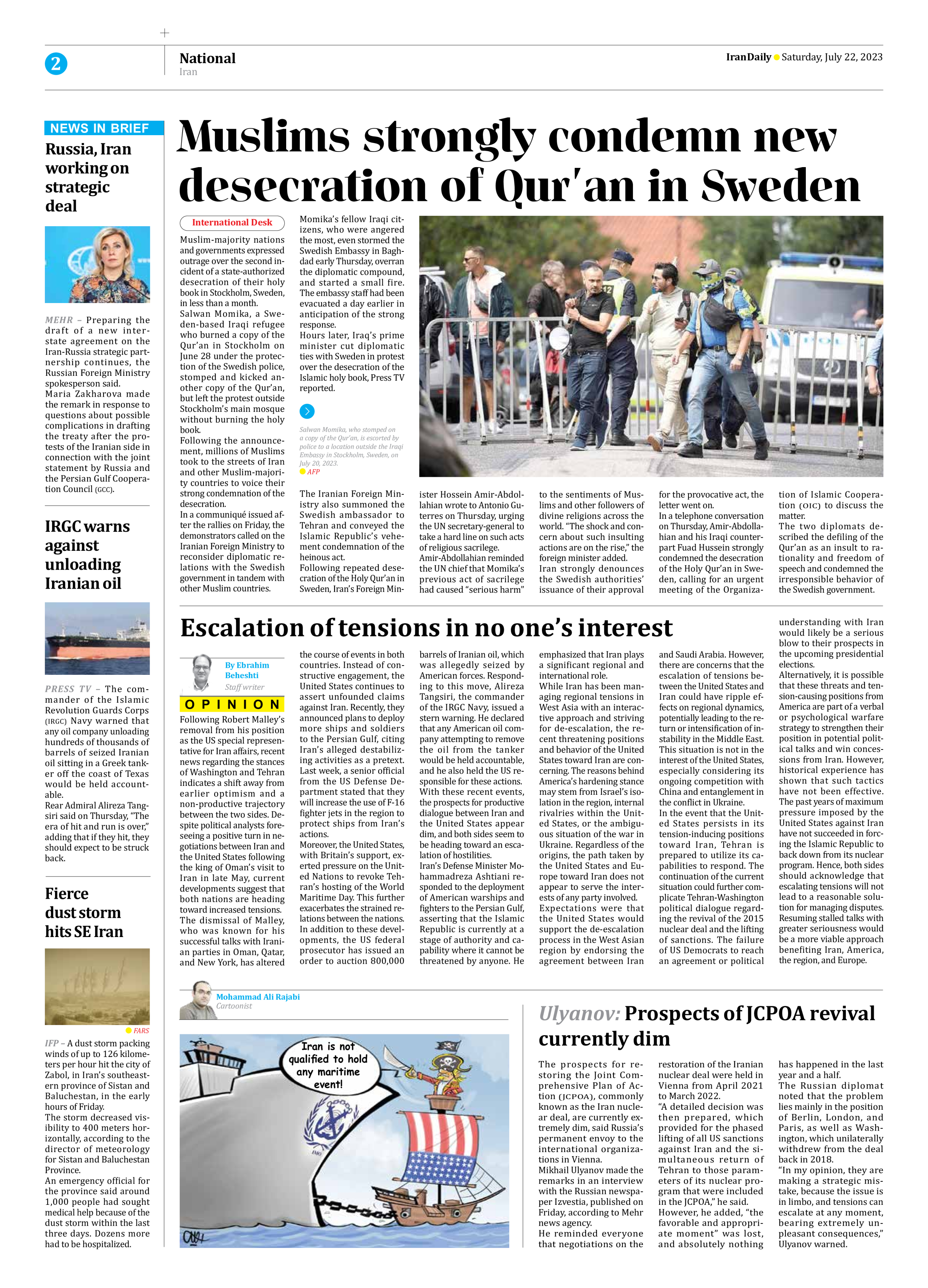
Escalation of tensions in no one’s interest
By Ebrahim Beheshti
Staff writer
Following Robert Malley’s removal from his position as the US special representative for Iran affairs, recent news regarding the stances of Washington and Tehran indicates a shift away from earlier optimism and a non-productive trajectory between the two sides. Despite political analysts foreseeing a positive turn in negotiations between Iran and the United States following the king of Oman’s visit to Iran in late May, current developments suggest that both nations are heading toward increased tensions.
The dismissal of Malley, who was known for his successful talks with Iranian parties in Oman, Qatar, and New York, has altered the course of events in both countries. Instead of constructive engagement, the United States continues to assert unfounded claims against Iran. Recently, they announced plans to deploy more ships and soldiers to the Persian Gulf, citing Iran’s alleged destabilizing activities as a pretext. Last week, a senior official from the US Defense Department stated that they will increase the use of F-16 fighter jets in the region to protect ships from Iran’s actions.
Moreover, the United States, with Britain’s support, exerted pressure on the United Nations to revoke Tehran’s hosting of the World Maritime Day. This further exacerbates the strained relations between the nations.
In addition to these developments, the US federal prosecutor has issued an order to auction 800,000 barrels of Iranian oil, which was allegedly seized by American forces. Responding to this move, Alireza Tangsiri, the commander of the IRGC Navy, issued a stern warning. He declared that any American oil company attempting to remove the oil from the tanker would be held accountable, and he also held the US responsible for these actions.
With these recent events, the prospects for productive dialogue between Iran and the United States appear dim, and both sides seem to be heading toward an escalation of hostilities.
Iran’s Defense Minister Mohammadreza Ashtiani responded to the deployment of American warships and fighters to the Persian Gulf, asserting that the Islamic Republic is currently at a stage of authority and capability where it cannot be threatened by anyone. He emphasized that Iran plays a significant regional and international role.
While Iran has been managing regional tensions in West Asia with an interactive approach and striving for de-escalation, the recent threatening positions and behavior of the United States toward Iran are concerning. The reasons behind America’s hardening stance may stem from Israel’s isolation in the region, internal rivalries within the United States, or the ambiguous situation of the war in Ukraine. Regardless of the origins, the path taken by the United States and Europe toward Iran does not appear to serve the interests of any party involved.
Expectations were that the United States would support the de-escalation process in the West Asian region by endorsing the agreement between Iran and Saudi Arabia. However, there are concerns that the escalation of tensions between the United States and Iran could have ripple effects on regional dynamics, potentially leading to the return or intensification of instability in the Middle East. This situation is not in the interest of the United States, especially considering its ongoing competition with China and entanglement in the conflict in Ukraine.
In the event that the United States persists in its tension-inducing positions toward Iran, Tehran is prepared to utilize its capabilities to respond. The continuation of the current situation could further complicate Tehran-Washington political dialogue regarding the revival of the 2015 nuclear deal and the lifting of sanctions. The failure of US Democrats to reach an agreement or political understanding with Iran would likely be a serious blow to their prospects in the upcoming presidential elections.
Alternatively, it is possible that these threats and tension-causing positions from America are part of a verbal or psychological warfare strategy to strengthen their position in potential political talks and win concessions from Iran. However, historical experience has shown that such tactics have not been effective. The past years of maximum pressure imposed by the United States against Iran have not succeeded in forcing the Islamic Republic to back down from its nuclear program. Hence, both sides should acknowledge that escalating tensions will not lead to a reasonable solution for managing disputes. Resuming stalled talks with greater seriousness would be a more viable approach benefiting Iran, America, the region, and Europe.







